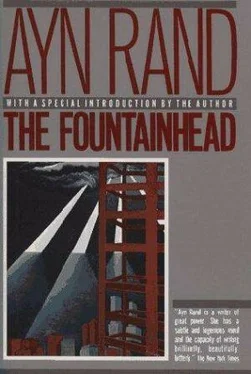"Yes, of course, Mother ... But ... Yes, I know, but.. Howard?"
It was a plea for help. Roark was there, on a davenport in the corner, half lying, sprawled limply like a kitten. It had often astonished Keating; he had seen Roark moving with the soundless tension, the control, the precision of a cat; he had seen him relaxed, like a cat, in shapeless ease, as if his body held no single solid bone. Roark glanced up at him. He said:
"Peter, you know how I feel about either one of your opportunities. Take your choice of the lesser evil. What will you learn at the Beaux-Arts? Only more Renaissance palaces and operetta settings. They'll kill everything you might have in you. You do good work, once in a while, when somebody lets you. If you really want to learn, go to work. Francon is a bastard and a fool, but you will be building. It will prepare you for going on your own that much sooner."
"Even Mr. Roark can talk sense sometimes," said Mrs. Keating, "even if he does talk like a truck driver."
"Do you really think that I do good work?" Keating looked at him, as if his eyes still held the reflection of that one sentence — and nothing else mattered.
"Occasionally," said Roark. "Not often."
"Now that it's all settled ... " began Mrs. Keating.
"I ... I'll have to think it over, Mother."
"Now that it's all settled, how about the hot chocolate? I'll have it out to you in a jiffy!"
She smiled at her son, an innocent smile that declared her obedience and gratitude, and she rustled out of the room.
Keating paced nervously, stopped, lighted a cigarette, stood spitting the smoke out in short jerks, then looked at Roark.
"What are you going to do now, Howard?"
"I?"
"Very thoughtless of me, I know, going on like that about myself. Mother means well, but she drives me crazy ... Well, to hell with that. What are you going to do?"
"I'm going to New York."
"Oh, swell. To get a job?"
"To get a job."
"In ... in architecture?"
"In architecture, Peter."
"That's grand. I'm glad. Got any definite prospects?
"I'm going to work for Henry Cameron."
"Oh, no, Howard!"
Roark smiled slowly, the corners of his mouth sharp, and said nothing.
"Oh, no, Howard!"
"Yes "
"But he's nothing, nobody any more! Oh, I know he has a name but he's done for! He never gets any important buildings, hasn't had any for years! They say he's got a dump for an office. What kind of future will you get out of him? What will you learn?"
"Not much. Only how to build."
"For God's sake, you can't go on like that, deliberately ruining yourself! I thought ... well, yes, I thought you'd learned something today!"
"I have."
"Look, Howard, if it's because you think that no one else will have you now, no one better, why, I'll help you. I'll work old Francon and I'll get connections and ... "
"Thank you, Peter. But it won't be necessary. It's settled.
"What did he say?"
"Who?"
"Cameron."
"I've never met him."
Then a horn screamed outside. Keating remembered, started off to change his clothes, collided with his mother at the door and knocked a cup off her loaded tray.
"Petey!"
"Never mind, Mother!" He seized her elbows. "I'm in a hurry, sweetheart. A little party with the boys — now, now, don't say anything — I won't be late and — look! We'll celebrate my going with Francon & Heyer!"
He kissed her impulsively, with the gay exuberance that made him irresistible at times, and flew out of the room, up the stairs. Mrs. Keating shook her head, flustered, reproving and happy.
In his room, while flinging his clothes in all directions, Keating thought suddenly of a wire he would send to New York. That particular subject had not been in his mind all day, but it came to him with a sense of desperate urgency; he wanted to send that wire now, at once. He scribbled it down on a piece of paper:
"Katie dearest coming New York job Francon love ever
"Peter"
That night Keating raced toward Boston, wedged in between two boys, the wind and the road whistling past him. And he thought that the world was opening to him now, like the darkness fleeing before the bobbing headlights. He was free. He was ready. In a few years — so very soon, for time did not exist in the speed of that car — his name would ring like a horn, ripping people out of sleep. He was ready to do great things, magnificent things, things unsurpassed in ... in ... oh, hell ... in architecture.
PETER KEATING looked at the streets of New York. The people, he observed, were extremely well dressed.
He had stopped for a moment before the building on Fifth Avenue, where the office of Francon & Heyer and his first day of work awaited him. He looked at the men who hurried past. Smart, he thought, smart as hell. He glanced regretfully at his own clothes. He had a great deal to learn in New York.
When he could delay it no longer, he turned to the door. It was a miniature Doric portico, every inch of it scaled down to the exact proportions decreed by the artists who had worn flowing Grecian tunics; between the marble perfection of the columns a revolving door sparkled with nickel plate, reflecting the streaks of automobiles flying past. Keating walked through the revolving door, through the lustrous marble lobby, to an elevator of gilt and red lacquer that brought him, thirty floors later, to a mahogany door. He saw a slender brass plate with delicate letters:
FRANCON & HEYER, ARCHITECTS.
The reception room of the office of Francon & Heyer, Architects, looked like a cool, intimate ballroom in a Colonial mansion. The silver white walls were paneled with flat pilasters; the pilasters were fluted and curved into Ionic snails; they supported little pediments broken in the middle to make room for half a Grecian urn plastered against the wall. Etchings of Greek temples adorned the panels, too small to be distinguished, but presenting the unmistakable columns, pediments and crumbling stone.
Quite incongruously, Keating felt as if a conveyor belt was under his feet, from the moment he crossed the threshold. It carried him to the reception clerk who sat at a telephone switchboard behind the white balustrade of a Florentine balcony. It transferred him to the threshold of a huge drafting room. He saw long, flat tables, a forest of twisted rods descending from the ceiling to end in green-shaded lamps, enormous blueprint files, towers of yellow drawers, papers, tin boxes, sample bricks, pots of glue and calendars from construction companies, most of them bearing pictures of naked women. The chief draftsman snapped at Keating, without quite seeing him. He was bored and crackling with purpose simultaneously. He jerked his thumb in the direction of a locker room, thrust his chin out toward the door of a locker, and stood, rocking from heels to toes, while Keating pulled a pearl-gray smock over his stiff, uncertain body. Francon had insisted on that smock. The conveyor belt stopped at a table in a corner of the drafting room, where Keating found himself with a set of plans to expand, the scaggy back of the chief draftsman retreating from him in the unmistakable manner of having forgotten his existence.
Keating bent over his task at once, his eyes fixed, his throat rigid. He saw nothing but the pearly shimmer of the paper before him. The steady lines he drew surprised him, for he felt certain that his hand was jerking an inch back and forth across the sheet. He followed the lines, not knowing where they led or why. He knew only that the plan was someone's tremendous achievement which he could neither question nor equal. He wondered why he had ever thought of himself as a potential architect.
Much later, he noticed the wrinkles of a gray smock sticking to a pair of shoulder blades over the next table. He glanced about him, cautiously at first, then with curiosity, then with pleasure, then with contempt. When he reached this last, Peter Keating became himself again and felt love for mankind. He noticed sallow cheeks, a funny nose, a wart on a receding chin, a stomach squashed against the edge of a table. He loved these sights. What these could do, he could do better. He smiled. Peter Keating needed his fellow men.
Читать дальше










